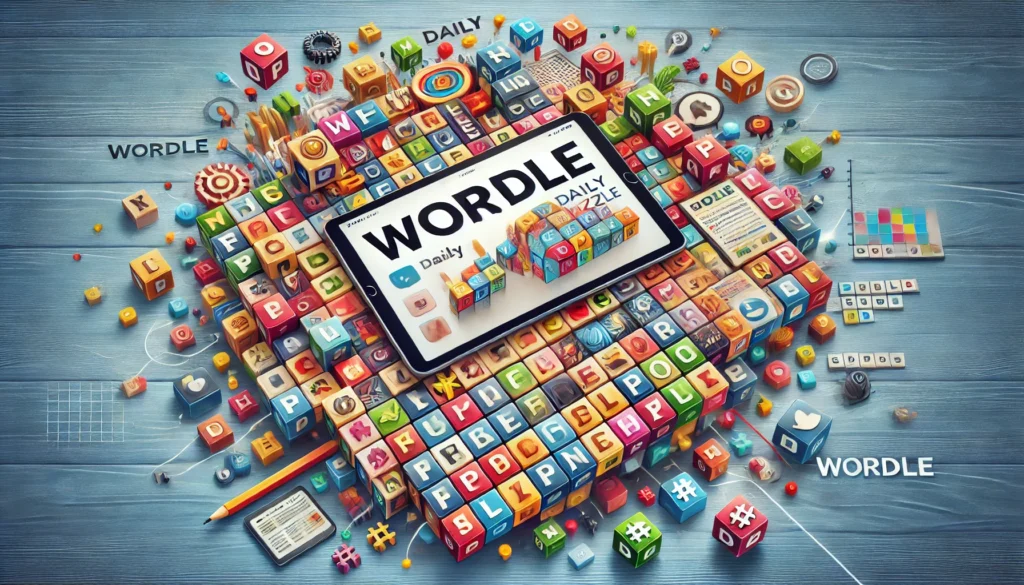Word games have always held a special place in the hearts of puzzle enthusiasts. In recent years, however, one particular word game has taken the internet by storm: Wordle. This simple yet addictive game challenges players to guess a five-letter word within six attempts, offering a daily mental challenge that has sparked a global sensation. Mashable, a popular digital media platform, has embraced the Wordle craze, offering daily coverage, strategies, and insights into the puzzle phenomenon – Mashable Wordle Today.
This article explores the rise of Wordle, its daily significance on Mashable, how it became a viral sensation, and why so many people look forward to solving the “Mashable Wordle Today” each morning. We’ll also dive into strategies for improving your Wordle game and discuss the cultural impact of this word puzzle.
What is Wordle?
Wordle is a free-to-play word puzzle game that was developed by software engineer Josh Wardle in October 2021. The game is simple but clever in its design: each day, a new five-letter word is chosen, and players have six chances to guess it. After each guess, the game gives feedback by changing the colors of the tiles representing the letters. If the letter turns green, it is in the correct spot. If it turns yellow, the letter is in the word but in the wrong spot. If it stays gray, the letter is not in the word at all – Mashable Wordle Today.
Wordle’s minimalist design and daily puzzle format set it apart from other games. Instead of offering multiple levels or endless gameplay, Wordle releases only one puzzle each day, creating anticipation for the next day’s challenge. This daily format adds to its appeal, as players worldwide log in to solve the same word puzzle and share their results on social media – Mashable Wordle Today.
How Mashable Became Involved with Wordle
As a leading platform for entertainment, technology, and pop culture, Mashable quickly recognized the viral potential of Wordle. The game’s explosive popularity led Mashable to feature Wordle regularly on its website, providing fans with daily articles that offer strategies, hints, and explanations of the day’s puzzle – Mashable Wordle Today.
Mashable’s Wordle Today” series has become a trusted resource for players who may need a little extra help in cracking the puzzle or who simply want to engage with the Wordle community. Each day, the website provides clues about the day’s Wordle solution without revealing the answer outright. This allows readers to get a nudge in the right direction while still experiencing the satisfaction of solving the puzzle on their own.
Mashable’s (Mashable Wordle Today) involvement with Wordle extends beyond simple daily posts. The platform has explored the cultural significance of the game, how it became a viral phenomenon, and why it has such a dedicated fanbase. Through interviews with players, analysis of gameplay strategies, and coverage of Wordle-inspired spinoffs, Mashable has positioned itself as a key player in the Wordle universe.
The Viral Sensation of Wordle
The success of Wordle (Mashable Wordle Today) can be attributed to several factors, including its simplicity, accessibility, and the sense of community it fosters. Unlike many mobile games that push in-app purchases or ads, Wordle remains free to play and ad-free. This purity of gameplay, coupled with the limited availability of only one puzzle per day, has helped to cultivate a dedicated following.
One of the most significant reasons behind Wordle’s virality is its shareability. After completing a puzzle, players can copy a grid representing their attempts, which uses colored emojis to display how many guesses it took to solve the word. The grid doesn’t spoil the answer but gives others an idea of how the player fared. This system, paired with the simplicity of sharing via social media, led to a flood of Wordle grids on platforms like Twitter, Facebook, and Instagram. It became common to see posts with grids labeled “Wordle #,” where players proudly displayed their successes—or frustrations – Mashable Wordle Today.
Wordle also managed to tap into the human need for routine and structure. The daily release of a new word became a morning ritual for many, something akin to checking the news or having a cup of coffee. Its ability to foster a global community of players—who all tackle the same puzzle simultaneously—created a shared experience that was magnified by social media – Mashable Wordle Today.
Why People Love Wordle
Wordle’s widespread popularity stems from several key factors:
1. It’s Simple Yet Challenging
Wordle strikes the perfect balance between simplicity and challenge. The rules are easy to grasp, but solving the puzzle can still require thoughtful consideration and creativity. Players have six chances to guess a five-letter word, but with each wrong guess, the pressure mounts – Mashable Wordle Today.
2. It’s Accessible to All
Wordle can be played by anyone with an internet connection, regardless of age or skill level. There are no download requirements or sign-ups involved. This accessibility is a major factor in the game’s popularity, as players from all walks of life can enjoy it without any barriers to entry.
3. It’s a Quick, Daily Mental Exercise
Unlike many games that require hours of dedication, Wordle offers a quick yet engaging mental challenge. The limited number of guesses and the single daily word mean that players don’t get sucked into endless hours of play. Instead, they enjoy a brief yet rewarding mental workout.
4. It Fosters a Sense of Community
Part of Wordle’s appeal is its ability to bring people together. Because everyone is solving the same puzzle each day, players feel a sense of connection to others around the world. Sharing results online, discussing strategies with friends, or competing for the fewest guesses all contribute to the game’s community spirit.
5. It’s Satisfying and Rewarding
Successfully solving the Wordle puzzle, especially on the first few guesses, brings an undeniable sense of accomplishment. The game’s design encourages players to celebrate their victories, and even when they don’t get the word, they still feel as though they’ve had a meaningful challenge.
Strategies for Solving Wordle
While Wordle may seem like a game of luck at first, there are several strategies that players can employ to increase their chances of solving the puzzle in fewer guesses – Mashable Wordle Today.
1. Start with Common Vowels and Consonants
The first word you choose is crucial in narrowing down possibilities. It’s wise to start with a word that contains common vowels (A, E, I, O, U) and frequently used consonants (such as S, T, R, N, L). Words like “raise,” “stone,” or “table” can provide valuable feedback early on.
2. Use Process of Elimination
Each guess provides important clues. If a letter is confirmed (green), focus on placing that letter in different positions to test the word’s structure. For yellow letters, move them around to see where they fit, and avoid repeating gray letters that are not in the word.
3. Think About Letter Combinations
Some letter combinations are common in English, such as “th,” “ch,” or “st.” As you narrow down possibilities, think about which letters might logically follow or precede the letters you’ve already discovered – Mashable Wordle Today.
4. Be Mindful of Plurals
Wordle puzzles typically use singular nouns, so avoid guessing plural forms that end in “s” too early in the game. Plurals can sometimes trip players up, especially if they’re thinking of words with an unnecessary “s” at the end.
5. Use Words with Multiple Vowels
Words that contain more than one vowel are valuable in early guesses, as they help identify which vowels are in the word. For example, words like “audio” or “media” can provide a lot of information -Mashable Wordle Today.
6. Don’t Rush
Take your time with each guess. Rushing can lead to hasty guesses that waste opportunities. Instead, think critically about each guess and how it can help narrow down your choices for the next word.
Mashable’s Role in the Wordle Community
As Wordle grew in popularity, Mashable became one of the go-to platforms for fans looking to enhance their Wordle experience. Through its daily “Mashable Wordle Today” articles, Mashable provides readers with hints, strategies, and explanations of the day’s puzzle. This coverage caters to players who might need a little extra help or are simply interested in understanding the logic behind the word choices.
Mashable’s content has also helped foster a sense of community among Wordle players. Readers can engage with the articles by discussing their approaches, sharing their strategies, or debating the difficulty of certain puzzles. This interaction enhances the collective experience of solving Wordle, turning what could be a solitary puzzle into a social activity.
Beyond daily coverage, Mashable (Mashable Wordle Today) has explored the broader cultural impact of Wordle, analyzing why the game resonates so strongly with modern audiences. From interviews with psychologists about the appeal of daily puzzles to discussions about Wordle’s place in internet culture, Mashable has positioned itself as a thought leader in the Wordle world.
The Impact of Wordle on Popular Culture
Wordle’s success has transcended the realm of simple word puzzles, influencing internet culture, language, and even other game formats. The game has inspired a slew of imitators, from math-based puzzles like Nerdle to geography challenges like Worldle. These spinoffs offer variations on the original Wordle format, catering to different interests while maintaining the same daily challenge structure – Mashable Wordle Today.
Wordle’s (Mashable Wordle Today) influence can also be seen in how language and word games are discussed in popular culture. The game has brought renewed interest in word puzzles, much like the crossword puzzle craze of decades past. Additionally, the concept of solving a daily challenge has expanded into other forms of media, where people look forward to their “daily fix” of a mental exercise.
Conclusion
Mashable’s coverage of Wordle highlights the lasting appeal of this seemingly simple word game. By offering daily insights, tips, and community engagement, Mashable has become a key player in the Wordle phenomenon, helping fans stay connected and improve their puzzle-solving skills. Wordle itself remains a testament to the power of simplicity, routine, and community in gaming.
As the game continues to evolve and inspire new iterations, Wordle’s place in popular culture is cemented. Whether you’re a casual player or a dedicated solver, the daily thrill of cracking the Wordle code remains as engaging as ever. For those looking to enhance their Wordle experience, Mashable Wordle Today articles provide the perfect companion, offering a helping hand without taking away the joy of discovery.
FAQs About Mashable Wordle Today
- What is Wordle? Wordle is a free online word puzzle game where players guess a five-letter word within six attempts. Each day offers a new word to solve.
- How does Mashable cover Wordle? Mashable provides daily articles with hints, strategies, and explanations for the day’s Wordle puzzle, helping players solve the challenge.
- What makes Wordle so popular? Wordle’s simplicity, accessibility, shareability, and daily puzzle format have contributed to its viral success and widespread appeal.
- What are some strategies for solving Wordle? Start with common vowels and consonants, use process of elimination, and think about common letter combinations to improve your chances of solving the puzzle.
- Does Wordle have any spinoffs? Yes, Wordle has inspired several spinoffs, including Nerdle (math-based) and Worldle (geography-based), which offer new challenges in a similar daily format.
- Why is Wordle culturally significant? Wordle has become a shared daily ritual for players around the world, influencing internet culture and inspiring new variations on the word puzzle format.







